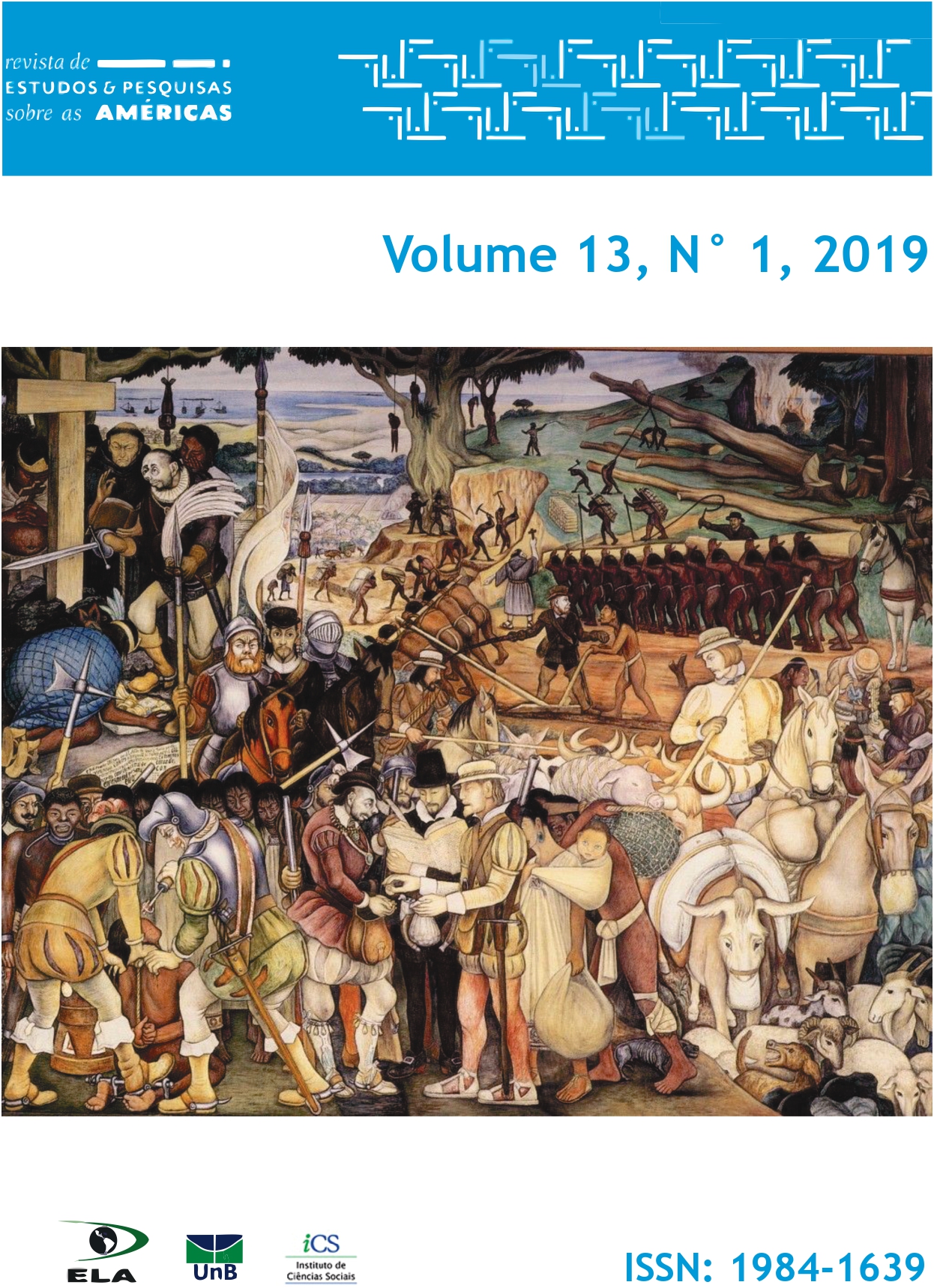Forced Displacement in Colombia and Refuge Policies in Brazil: management of populations in exodus
DOI:
https://doi.org/10.21057/10.21057/repamv13n1.2019.21877Keywords:
Refuge, Resettlement, Colombia, BrazilAbstract
Based on an ethnographic research on refugee processes of Colombian nationals in Brazil, the article discusses practices and formats of production and management of subjects in the contemporary government of populations in exodus. The paper argues that the precariousness of public policies is not tantamount to an absence of state power to produce excludable subjects and / or to filter out those who will be recognized and those who will be embedded in other migratory categories or left out. From an anthropological perspective, from what we might call an ethnography of the State, the text takes seriously the failure to do and make it precarious as powerful forces of political action, exposing, in a concrete way, some practices of the Brazilian administrative traditions in the management of refugees that it was possible to identify in field research.
Downloads
References
ABRAMS, Philip. “Notes on the Difficulty of Studyng the State”, en Scharma y Gupta, The Anthropology of the State. A reader, Balckwell Publishing, pp. 112-130, 2004.
ANZALDUA, Gloria. Borderlans/La frontera The new mestiza. Tradução Carmen Valle, Capitán Swing: Madrid, 2016.
BETANCUR, María Soledad, “Del estatuto de seguridad al estado comunitario: veinticinco años de criminalización de la protesta social en Colombia” In: Movimientos sociales y gobiernos en la región andina - Resistencias y alternativas. Lo político y lo social. Buenos Aires: Observatorio Social de América Latina, Consejo Latinoamericano de Ciencias Sociales, p. 179-185, Año VII, Nº 19, enero-abril, 2006.
BOLTANSKI, Luc. La Souffrance a Distance: morale humanitaire, médias et politique. Paris: Métailié, Collection Leçons de choses, 1993.
CHO, Grace. Haunting the Korean Diaspora: Shame, secrecy and the forgotten war. Minneapolis: University of Minnesota Press, 2008.
DAS, Veena. “Trauma y testimonio”. In: Ortega, Francisco (Ed). Sujetos de dolor, agentes de dignidad. Bogotá: Universidad Nacional de Colombia, Colección Lecturas CES, p. 145-169, 2008.
DAS, Venna & POOLE, Deborah. “State and its margins: comparative ethnographies”, In: Venna Das y Deborah Poole. Anthropology in the Margins of the State. Santa Fe: School of American Research Press, pp. 3-33, 2004.
FOUCAULT, Michel. “El sujeto y el poder”. In: Revista Mexicana de Sociología, México, v. 50, n. 3, p. 3-20, jul./sep., 1988.
HAMID, Sonia. (Des) Integrando Refugiados: Os Processos do Reassentamento de Palestinos no Brasil. Tese doutoral. Universidade de Brasília, programa de Pós-Graduação em Antropologia Social, 2012.
HERZFELD, Michael. The social production of the indifference. Exploring the symbolic roots of Western bureaucracy. Chicago: University of Chicago Press, 1992.
JARDIM, Denise Fagundes. “Palestinos: as redefinições de fronteiras e cidadania”. In: Horizontes Antropológicos, Jul, vol.9, no.19, p.223-243, 2003.
MALKKI, Liisa. Purity and exile: violence, memory, and national cosmology among Hutu refugees in Tanzania. Chicago: University of Chicago Press, 1995.
MITCHELL, Timothy. “sociedad, economía y el efecto Estado”. In: Abrams; Gupta & Mitchell (eds.) Antropología del Estado. México: Fondo de Cultura Económica, pp. 145-183, 2015.
MOULIN, Carolina. “Os direitos humanos dos humanos sem direitos: refugiados e a política do protesto”. In: Revista brasileira de Ciências Sociais, Jun, vol.26, no.76, p.145-155, 2011.
POLLAK, Michael. L’expérience concentrationnaire. Essai sur Le maintien de l’identité sociale. Paris: Éditions Métailié, 1990.
RADHAY, Rachael. Discurso e poder na política da imigração brasileira. Tese de doutorado em linguística, Universidade de Brasília, UNB, 2006.
RAMIREZ, María Clemencia. Entre el Estado y la guerrilla: identidad y ciudadanía en el movimiento de los campesinos cocaleros del Putumayo. Bogotá: ICANH, 2001.
SAYAD, Abdelmalek. L’immigration ou les paradoxes de l’altérité. Bruxelles: De Boeck Université; Paris: Universitaires, 1991.
SEYFERTH, Giralda. “Assimilação dos Imigrantes no Brasil: Inconstâncias de um Conceito Problemático”. In: Revista Travessia, São Paulo, v. 36, p. 44-50, 2000.
SOUZA LIMA, Antonio. Um grande cerco de paz: poder tutelar, indianidade e formação do Estado no Brasil. Petrópolis: Vozes, 1995.
SOUZA LIMA, Antonio. “O exercício da tutela sobre os povos indígenas: considerações para o entendimento das políticas indigenistas no Brasil contemporâneo”. In: Revista de Antropologia da USP, São Paulo, v. 55, n. 2, 2012.
TROUILLOT, Michel-Rolph. “The anthropology of the state in the age of globalization. Close encounters of the deceptive kind”. In: Current Anthropology, v. 42, n. 1, p. 125-138, 2001.
VIANNA, Adriana. Limites da menoridade: tutela, família e autoridade em julgamento. Tese doutoral, Universidade Federal do Rio de Janeiro, Museu Nacional, Programa de Pós-Graduação em Antropologia Social, 2002.
COAUTOR E AUTOR.
VIEIRA, Rosa. “O governo da mobilidade Haitiana no Brasil”. In: Revista Mana, Jan, vol.23, no.1, p.229-254, 2017.
Downloads
Published
How to Cite
Issue
Section
License
The published material is the property of the Journal, and may be reproduced in whole or in part with indication of the source.
Copyright: Authors will be responsible for obtaining the copyright of the material used. Authors who publish in this journal agree to the following terms:
a)Authors retain the copyright and grant the journal the right of first publication, with the work simultaneously licensed under
the Creative Commons Attribution License which allows the sharing of work with acknowledgment of authorship and initial publication in this journal.
b) Authors are authorized to take additional contracts separately, for non-exclusive distribution of the version of the work published in this journal (eg, publish in institutional repository or as a book chapter), with acknowledgment of authorship and initial publication in this journal.
c) Authors are allowed and encouraged to publish and distribute their work online (eg in institutional repositories or on their personal page) at any point before or during the editorial process, as this can generate productive changes as well as increase the impact and the citation of the published work (See The Effect of Free Access).
















